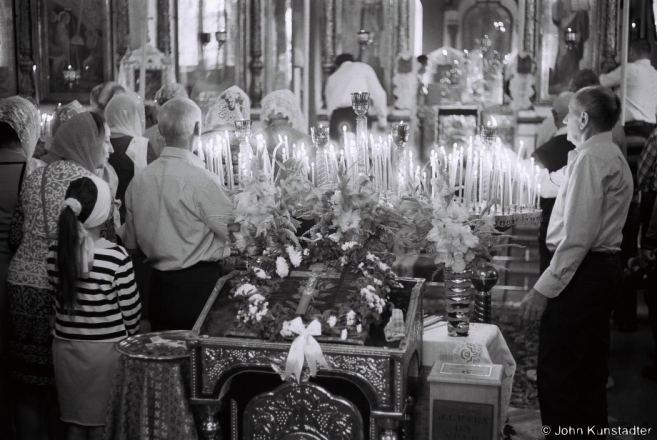Feast of the Maccabees (Makauje)/Honey-Blessing feast (Mjadovy Spas), Davyd-Haradok 2017: I/V.
August 14 is one of the clearest examples of syncretism, the overlapping or fusion of Christian and pre-Christian rites, in the Belarusian cycle of the year.
From pre-Christian times, Belarusians have observed rites in August to mark the transition from summer to autumn, from cultivation to harvest-time. The feast of the Maccabees (Makauje)/Honey-Blessing feast on August 14, the first of several Belarusian harvest-related feasts, is traditionally marked by the blessing of both water from a sacred source and summer honey.
In the Orthodox calendar August 14 marks the first day of the two-week Dormition Fast, and the first of four major Orthodox feasts through August 29. The fast culminates in the Feast of the Dormition on August 28, equivalent to the Roman Catholic feast of the Assumption on August 15. Orthodox Christians celebrate August 14 as Makauje (Макаўе), the commemoration of the martyrdom for their faith of the Maccabees, and Mjadovy Spas (Мядовы спас), the Honey-Blessing Feast. The word Makauje illustrates how the Church chose a similar-sounding name — Maccabees — to absorb the pre-Christian practice around this date of sprinkling poppy seeds (мак – “mak”) in the home and stables to ward off evil spirits.
Most celebrations of Mjadovy Spas in Belarus emphasize the blessing of honey and water and the ritual washing of one’s eyes to gain spiritual health and insight. Reflecting the strong local horticultural tradition in and around Davyd-Haradok, the parish of the Mother of God of Kazan focuses fervently on the blessing of flowers.
Макаўе/Мядовы спас, Давыд-Гарадок 2017 г.: I/V.
З-за моцнай традыцыі садаводства ў Давыд-Гарадку, прыход Маці Божай Казанскай сьвяткуе Мядовы Спас інтэнсіўным асьвячэньнем кветак.
Cross surrounded by flowers.
Крыж (замест абраза) акружаны кветкамі.
